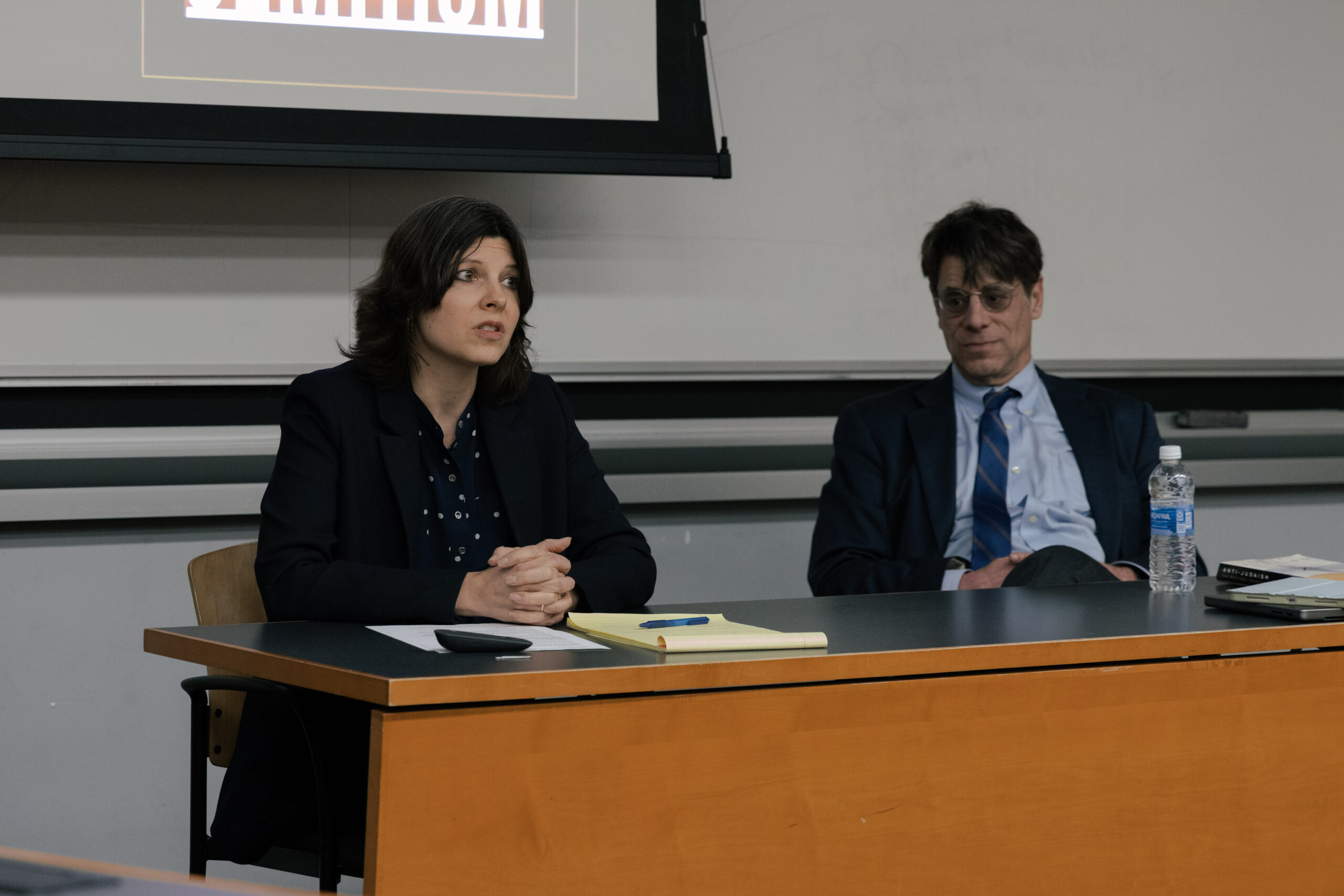Interdisciplinary Studies Department Hosts Antisemitism Lecture 500 Days After Oct. 7 Attack

Professors Kerry Wallach of German studies and Stephen Stern of Jewish and interdisciplinary studies spoke on antisemitism on Tuesday. (Sofia Gutierrez/The Gettysburgian)
By Nathaniel Swindell, Staff Writer
The interdisciplinary studies department held a lecture and Q&A on antisemitism on Tuesday, Feb. 18 — exactly 500 days after the Oct. 7 attack on Israel by Hamas. The event was led by professor Stephen Stern of Jewish and interdisciplinary studies and professor Kerry Wallach, chair of German studies. The lecture focused heavily on Jewish persecution and antisemitism throughout history, as well as its influence and impact in the modern day.
“It is impossible to study Jewish history without studying antisemitism,” said Wallach.
The talk began with the historical background of antisemitism, explaining the interactions with Christianity that Judaism has had throughout the centuries, and what this has led to for Jews worldwide.
“But Christianity is a giant appropriation of Judaism, and for 2000 years it subjugated Jews that culminated in the Holocaust,” said Stern.
The talk then went into the various reasons Jews had been persecuted for thousands of years, touching on Jewish stereotypes such as Shylock from Shakespeare’s “The Merchant of Venice,” whose existence has been used to perpetuate negative Jewish stereotypes and influenced Jewish persecution.
“If we want to end antisemitism, we have to address it here,” said Stern. “We have to acknowledge it here. We can’t pretend like we don’t know this. Because why is it happening again? I’ll tell you why it happens as well. It happens in economic and political transitions, it erupts out of nowhere and it’s a storm that is really unstoppable in many ways, at least historically it has been. So when Jews get worried about it, they’re worried about being murdered, ‘cause that’s what’s happened in history.”

Professor Stephen Stern speaking during the lecture. (Sofia Gutierrez/The Gettysburgian)
Moving ahead from the past, Wallach and Stern explained that even today antisemitism is on the rise, with reports of antisemitic incidents on college campuses across America on the rise.
“Just imagine being that person who, in every single encounter you have with a person you don’t know, there’s a negotiation,” said Wallach. “Where you’re trying to figure out, is this person a friend or a foe, is this person someone who hates me or disagrees with me?”
Additionally, Wallach made mention of the war in Gaza and said that it has influenced people’s thinking on Judaism as a whole, and not for the better.
“We can see this rise in antisemitic incidents, and it’s not just last year, it’s since 2014,” she said. “There was also sort of a flare-up in the Israeli-Palestinian conflict in 2014, it was around when the World Cup was happening, and that really resulted in flare-ups and increases of antisemitism and antisemitic violence in Europe. The problem is, some people, to put it succinctly, some people who hold anti-Israel positions or anti-Zionist positions project those sentiments onto all Jews.”
The hope held by the department is that, in the future, Jewish studies will become much more commonplace, so that antisemitic views and ideas become less frequent.
“They asked what I saw for the future of Jewish studies; I said, the hope is it will disappear because it’ll become so integrated,” said Stern. “That every class does it. That every class in the humanities focuses on it.”
Editor’s Note: This article was updated to correct a misspelled first name – V. DiFonzo
